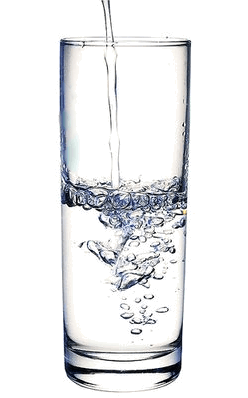Well-being goes beyond the age old idea of the absence of illness and healthcare implies a proactive stance towards achieving optimum physical, mental, and emotional well being.
In contemporary times, there is much concern about what one should and should not eat. Quality of food, no doubt, affects and reflects quality of life. Food choices are shaped by upbringing and culture, and influenced by where one lives, personal needs and daily activity. Lifestyle choices, cultural standing and acute or chronic illnesses all have their significance in creating and sustaining long health.
A nutritionally adequate vegetarian diet is healthful for everyone at all stages of life and may be beneficial in the prevention and treatment of certain diseases, but whether vegetarian or carnivore, there a few essential elements that are absolutely fundamental for all bodily function and well-being.
1) water
 Nature’s great remedy is water, yet few make an intelligent use of it as a matter of habit in their daily lives.
Nature’s great remedy is water, yet few make an intelligent use of it as a matter of habit in their daily lives.
In the human body, water fulfills similar functions to that of the earth, it acts as a solvent, dissolving food, nutrients and minerals so they can be assimilated while removing waste and regulating temperature.
Consider that the body is composed of some 60 to 80% water, it follows then that the quality and quantity of water consumed directly affects and reflects quality of life, physically, mentally and emotionally.
2) magnesium
 Magnesium is the fourth most abundant mineral in the human body and is needed for more than 300 biochemical reactions in the body.
Magnesium is the fourth most abundant mineral in the human body and is needed for more than 300 biochemical reactions in the body.
An adult body contains approximately 25 g magnesium, with 50% to 60% present in the bones, 1% in our blood and most of the rest in soft tissues.
It’s a small part but very important for health and well-being aiding in the body’s absorption of calcium and also playing a key role in the strength and formation of bones and teeth. This means that those at risk for osteoporosis can benefit from taking magnesium.
Vital for maintaining a healthy heart by helping to stabilize the rhythm and helping to prevent abnormal blood clotting, magnesium aids in maintaining healthy blood pressure levels, can significantly lower the chance of heart attacks and strokes, and can even aid in the recovery from a heart attack or stroke.
Magnesium also helps maintain proper muscle function. It works to keep muscles properly relaxed. Because of its benefits in relieving stiff muscles, magnesium can be especially beneficial to fibromyalgia patients. It is also used for treating attention deficit-hyperactivity disorder (ADHD), anxiety, chronic fatigue syndrome (CFS), Lyme disease, leg cramps during pregnancy, diabetes, kidney stones, migraine headaches, weak bones (osteoporosis), premenstrual syndrome (PMS), altitude sickness, urinary incontinence, restless leg syndrome, asthma, hayfever, multiple sclerosis, and for preventing hearing loss.
3) amino acids
Amino acids and proteins are the building blocks of life as well as a source of energy by the body. When proteins are digested or broken down, amino acids are left.[column width=”50%” padding=”10px”] The human body uses amino acids to make proteins to help the body:
 Break down food
Break down food- Grow
- Repair body tissue[/column]
- Essential amino acids
- Nonessential amino acids
- Conditional amino acids[/column]
The nine essential amino acids are: histidine, isoleucine, leucine, lysine, methionine, phenylalanine, threonine, tryptophan, and valine.
“Nonessential” means that our bodies produce an amino acid, even if we don’t get it from the food we eat. They include: alanine, asparagine, aspartic acid, and glutamic acid.
Conditional amino acids are usually not essential, except in times of illness and stress. They include: arginine, cysteine, glutamine, tyrosine, glycine, ornithine, proline, and serine.
4) probiotics
 Probiotics literally translates to “for life”, are live bacterial supplements, which improve and maintain the body’s naturally occurring gut flora; the intestinal microbial balance of the beneficial bacterium found in a healthy intestinal tract.
Probiotics literally translates to “for life”, are live bacterial supplements, which improve and maintain the body’s naturally occurring gut flora; the intestinal microbial balance of the beneficial bacterium found in a healthy intestinal tract.
Used for centuries as natural components in health-promoting foods, they improve immune system and gastrointestinal functions assisting in digestion and managing lactose intolerance.
They combat allergies, excessive alcohol intake, stress, exposure to toxic substances, prevent colon cancer, lower cholesterol and blood pressure, prevent infections, reduce inflammation and improve mineral absorption.
Common forms include lactobacillus, acidophilus and bifid bacterium, which is found in yogurt.
5) liquid nutrients

Liquid nutrition is popular among athletes, fitness trainers and body builders because the nutrients get to the areas of the body where they are needed and used before and after a workout. If your living a not so healthy lifestyle or are constantly getting sick,
Using liquid nutrition to feed your body fast will help you become stronger and strengthen your immune system.
Incorporating good quality whole food liquid supplements into your daily routines provides desperately needed vital nutrients that are more easily absorbed by your body.

